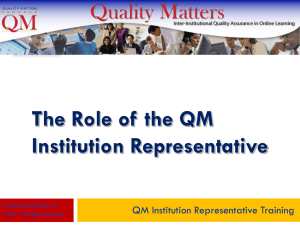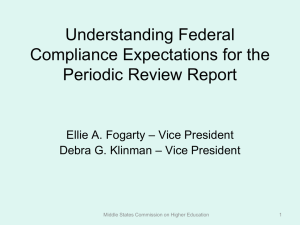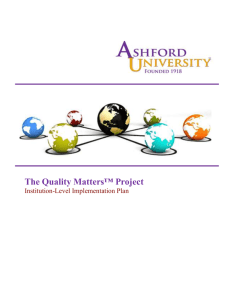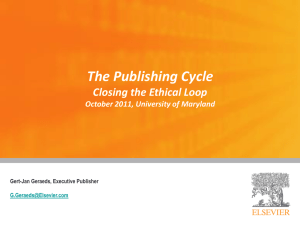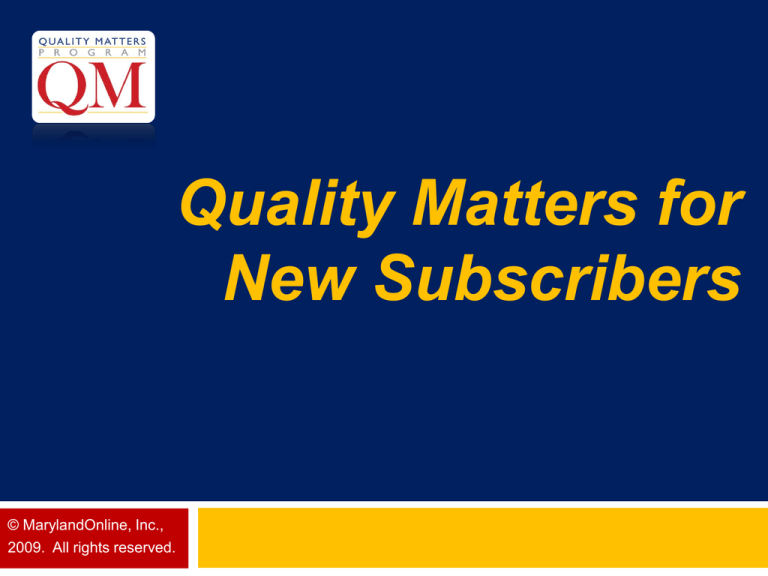
Quality Matters for
New Subscribers
© MarylandOnline, Inc.,
2009. All rights reserved.
Agenda for QM Overview
•Program Introduction
QM Basics
Rubric
Course Reviews
Trainings
Implementing QM
How to promote on Campus
How current subscribers are using training, the
rubric and course reviews
Questions?
What is Quality Matters?
“Quality Matters: Inter-Institutional Quality
Assurance in Online Learning”
Quality Matters is a not-for-profit subscription
service providing tools and training for quality
assurance of online courses
Developed by MarylandOnline with funding from
FIPSE, it was designed by faculty for faculty
Adopted by a large and broad user base, QM
represents a shared understanding of quality in
online course design
Quality Matters is …
A set of standards (rubric) for the design of online
and hybrid courses
A peer review process (faculty to faculty) for
reviewing and improving online and hybrid courses
A faculty support tool used by instructional
development staff
A professional development opportunity
The QM Approach
The QM toolset and process
A faculty-driven, peer review process that is…
Collaborative
Collegial
Continuous
Centered - in academic foundation
- around student learning
QM’s Role in Quality Assurance
QM looks at course design
The harnessing of technology to deliver instruction and
promote student learning
QM provides a process for peer-to-peer feedback
for faculty in the continuous improvement of their
course
Quality Matters is not the complete answer to
quality assurance for online education, but it can be
a critical component
What Quality Matters is NOT
Not about an individual instructor
(it’s about the course design)
Not about faculty evaluation
(it’s about course quality)
Not a win/lose or pass/fail test
(it’s a diagnostic tool to facilitate continuous
improvement of online/hybrid courses)
QM as a National Standard
490 + current subscribers
More than 45 states represented
QM has trained 8000+ faculty and
instructional design staff
Recognized by
- Sloan C Excellence in Online Teaching and Learning
Award
-2008 USDLA Outstanding Leadership in the field of
Distance Learning
Quality Matters Subscribers
WASHINGTON
MONTANA
NORTH
DAKOTA
MAINE
MINNESOTA
OREGON
VT
NH
WISCONSIN
SOUTH
DAKOTA
IDAHO
MICHIGAN
WYOMING
NEBRASKA
MASS
NEW YORK
RI
CONN
PENN
IOWA
NEVADA
OHIO
DELAWARE
INDIANA
UTAH
ILLINOIS
COLORADO
WV
MARYLAND
KANSAS
VIRGINIA
MISSOURI
KENTUCKY
CALIFORNIA
NORTH
CAROLINA
TENNESSEE
ARIZONA
OKLAHOMA
NEW
JERSEY
ARKANSAS
SOUTH
CAROLINA
NEW MEXICO
MISS
ALABAMA
GEORGIA
TEXAS
LOUISIANA
FLORIDA
PUERTO RICO
Current Subscribers
Consortium Subscribers
ALASKA
Statewide Subscribers
HAWAII
VIRGIN
ISLANDS
QM Basics:
More than the Sum of its (3)
Parts
The Rubric is the Core of QM
Consisting of:
8 key areas (general standards) of course quality
40 specific review standards
Including 17 essential standards
and detailed annotations and examples of good
practice for all 40 standards
The Rubric
Eight standards:
Course
Overview and Introduction
Learning Objectives
Assessment and Measurement
Resources and Materials
Learner Interaction
Course Technology
Learner Support
Accessibility
Key components
must align.
How institutions are using the Rubric
Reported uses consist of:
Course development checklists for faculty
Faculty training
Faculty engagement with national standards
supported by research
Unofficial course reviews by instruction design staff
Official QM Managed course reviews
Official Subscriber Managed course reviews
Quality process indicators for accreditation selfstudies
The Peer Review Process
Quality Matters:
Peer Course Review
Process
Institutions
Faculty Course
Developers
Course
Course
continues to
be offered
Course Meets
Quality Expectations
National Standards &
Research Literature
Rubric
Faculty Reviewers
Training
Peer Course
Review
Feedback
Course
Revision
Instructional Designers
and/or Faculty
Developers
Types of Course Reviews
Unofficial Reviews
•
Internal/Informal subscriber reviews not required to
follow QM process
Official Reviews
•
QM-Managed review - QM manages and pays
review team
Subscriber-Managed review - Subscriber manages
and pays review team
The Peer Review Team
On an official review, this consists of:
3 QM-Certified Peer Reviewers
•
Pre-requisite: Current online teaching experience
The chair is a Master Reviewer
•
Peer Reviewer with additional experience and training
One reviewer must be a subject matter expert
At least one reviewer must external to the institution
sponsoring the course
Peer Feedback
The peer feedback provided in a course
review is collegial in tone and language;
however, the reviews are rigorous and
even courses that meet standards will
benefit from the detailed, specific, and
relevant feedback that is provided.
Rubric Scoring
Points are awarded for each of 40 specific standards
based on the team majority decision
Specific standards have a point value of 1, 2, or 3; the
total points possible in a review is 85
If 2-3 Reviewers believe that a standard is:
met, then the full pre-assigned points are awarded
not met, then zero points are awarded
A course must receive at least 72 points (85%) and meet
all essential standards to be recognized by QM.
QM Recognized Courses
Course reviews take 4-6 weeks and there
is a 20 week window for reviews, including
any amendments, to be completed
QM recognition is provided
by year recognized
QM logo on course and catalog; registry
on QM website
How institutions are using course
reviews
Reported uses:
Provide specific and detailed peer feedback to
faculty on the design of their online/hybrid courses
Serve as a quality threshold for new courses
Systematically and objectively improve old courses
Benchmark all Master courses
To market specific programs with QM certified
courses
Quality process indicators for accreditation selfstudies
Quality Matters Training
Types of Professional Development
Delivery Options:
Online – virtual, asynchronous
Onsite – face-to-face, synchronous
Elluminate – virtual, synchronous
Focus:
QM Implementation
Prepare faculty and staff to hold QM roles
Faculty Development Workshops
Prepare faculty to design and improve courses
Faculty Development Workshops
Course-focused Workshops
Applying the QM Rubric*
Build Your Online Course
Improve Your Online Course
Build Your Hybrid/Blended
Course
*Note: Flagship training is also
required for QM
Implementation
Standards-Focused Workshops
Design that Welcomes Your
Students
Create Measurable Learning
Objectives
Choose and Use Media
Effectively
Addressing Accessibility
Standards Alignment Workshops
Investigate Learning
Objectives and Assessments
Link Instructional Materials
and Learner Engagement
QM Implementation: Role Trainings
Applying the QM Rubric (APPQMR)
Peer Reviewer Certification*
Applying the QM Rubric/Peer Reviewer Certification*
Master Reviewer Training*
Train-the-Trainer*
TTT/F2F: For face-to-face delivery of APPQMR
TTT/Online: For online delivery of APPQMR
Institution Representative Training*
*Offered online only
Training for scalability and self-sufficiency
Implementing Quality Matters
Applying the QM Rubric – pre-requisite for all following
Peer Reviewer Certification – generates official peer reviewers
Master Reviewer – builds more independence, and potentially
reduces expense, with own team chairs
Train-the-Trainer - internal trainer builds internal capacity for
course reviews at lower cost
Institution Representative/ Course Review Manager – develops
knowledge in implementing QM and lowers cost of running
subscriber-managed course reviews
How institutions are using QM
Training
Reported uses:
Educate faculty about quality in online courses
Expedite the course development process and
reduce time and labor in designing courses.
Provide professional development opportunities
for faculty and staff
Threshold requirement for adjunct faculty
Inform teaching practices related to design and
structure for BOTH online and F2F courses
Quality process indicators for accreditation selfstudies
Implementing QM:
Choices to Make
Subscription Options
Full Option
Basic Option
Benefits:
Rubric
Subscriber
IR
Benefits:
Rubric
Discounts
Training
MyQM & User’s Group
Training License
Subscriber-Managed
Course Reviews
Subscriber
IR
Discounts
Training
MyQM & User’s Group
Scalability in Implementing QM
Managing Your Reviews
Unofficial (not
recognized by
QM)
• Internal QA
• No QM requirements
• No QM fees
Official QMManaged
• External QA
• Courses must meet
submission guidelines
• Fee for Service
Official
SubscriberManaged
• External QA
• Review follows official
QM process
• Fee for certification*
Delivering Your Training (APPQMR)
Customized
(not
recognized by
QM)
• Adapt for internal
needs
• For internal use only
• No QM fees
QM-Delivered
• Required for peer
reviewer & other QM
roles
• Fee for Service
SubscriberDelivered
• Required for peer
reviewer & other QM
roles; Trainer must be
certified
• Does not include PRC
Implementing QM: Roles & Criteria
Peer Reviewers
Independent
Trainers
Master
Reviewers
Course Review
Manager
Institution
Representative
Current Online
Instructor
Applying the
QM Rubric
Workshop
Certified QM
Peer Reviewer
Applying the
QM Rubric
Workshop
Designated by
institution
Applying the
QM Rubric
Workshop
(online or F2F)
Peer Reviewer
Course
(certification not
required)
Experience on
2+ course
reviews
Institution
Representative
Course
Institution
Representative
Course
Peer Reviewer
Course (online)
Train-the Trainer
Workshop
Master Reviewer
Workshop
Institution on Full
Subscription
Submission of
application &
MOU (for
certification)
Institution on Full
or Statewide
Subscription
Annual Recertification
Decisions in Customizing QM
Governance –
Who will lead a QM project and where will it report?
QM can impact institutional policy and process!
Engagement –
How will you gain faculty commitment?
Communication, training opportunities, incentives…?
Rubric Use –
For course improvement, development, assessment?
Course Reviews –
Mandatory or optional, official or informal? Which courses
Training Criteria & QM Roles
Who will take the flagship training? Who will become
certified? Will anyone train? Who will manage?
The Important Role of the IR:
The primary point of contact for Quality
Matters, IRs facilitate communication
between QM and your institution. Know
principles and policies, contract terms and
QM roles and criteria.
Select the appropriate trainings (audience,
delivery format, schedules) and construct a
training timeline for your institution.
Use tools & manage course reviews
QM is about making online instruction as
good as it can be? What are your goals?
Improved courses
Engaged faculty
Reduced course
development time
Ongoing faculty
development
Quality benchmarking
Awareness & support
for online learning
Institutional
improvement
85 %
We are here for you! QM Contacts:
• Deb Adair, Director:
dadair@qualitymatters.org
• Grace Hall, Communications
Manager:
ghall@qualitymatters.org
• Angela Heath, Training
Administrator:
aheath@qualitymatters.org
• Michelle Pierpont, Subscriber
Services Manager
mpierpont@qualitymatters.org
• Melissa Poole, Course Review
Manager
mpoole@qualitymatters.org
• Heather Libonate, Technology
Coordinator,
hlibonate@qualitymatters.org
Toll Free Number 1-866-851-4984
Thanks to YOU…
Quality Matters!


